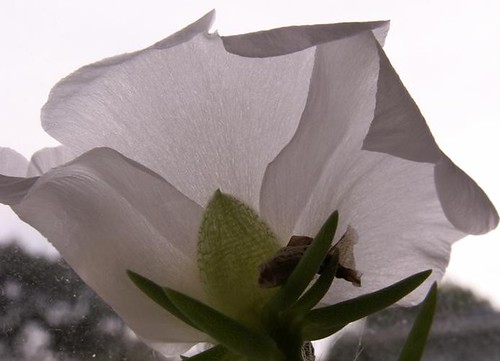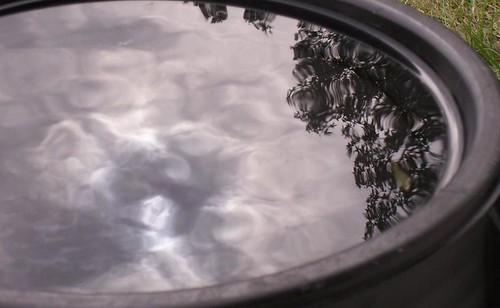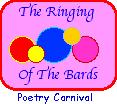Nether Petals, Mirrored Worlds, and Secret Words

Underside of a white portulaca, detail
On looking at things from the other side....
A while back I had taken this shot of our white portulaca when it was outdoors in the summer sun. We've since brought it indoors to protect it from the cold. Even on this cloudy day I admired the way light diffused through its petals -- so took a shot from the underside:

When we did our "post office walk" last night I took my tripod along, in case I came across holiday lights that caught my fancy. Recent rains created the generous puddle beside this house.

I hadn't expected the sky to clear, but by the time we were heading home I had a great view of the latest Moon-Mars conjunction.

Mars shows up dimly in the upper left-hand corner. The Moon here is 87 percent of full, which will occur on the 15th. According to Fact Monster, actual conjunction occured at midnight Sunday into Monday, when Mars was 1 degree 3 minutes south of the Moon. (The full Moon is approximately a half-degree in diameter.) From parts of Siberia, the Moon occulted Mars, hiding it from view altogether.
Last month's Moon-Mars conjunction had these two bodies 3 degrees apart: almost three times the distance they were from each other this time around.
Today began brilliantly clear, then again clouded up.

The sun is up there somewhere, trying to peek through. After I took this shot I opened up our barrel and spilled the collected water inside.
On my walk home from the post office I was intrigued by the textures in these clouds.

The Secret Word Game
Mary taught me this game years ago. It can be played at levels appropriate to both children and adults, depending on the length of the words involved. Reading Colleen's wonderful entries on Scrabble have inspired me to post the rules.
Object of the Game:
Guess your opponent's secret word. (This game works best with 2 players.)
Rules:
First, agree on the parameters:
1. How many letters should the secret word have? Note that the guessed words must have the same number of letters as the secret word.
2. Can the secret word have double letters? (For example, "carpool" has a double-o). (Y/N)
3. Can guessed words have double letters? (Y/N)
4. Can the word be a place name or proper name? (Y/N)
Usually we specify that our secret words have no double letters, but our guess words can.
Young children can do short words (e.g., cat, dog, top, etc.). Adults can do longer words (e.g., montage, uncharted). I don’t think Mary and I have gone longer than 9-letter words yet. Typically, the longer the word, the longer the game takes to play. We've been able to play without the use of paper, relying only on memory, using words of 5 or fewer letters.
Playing the Game:
1. Each opponent chooses a secret word, which the other person tries to guess.
Let’s say my word is "quick". If you go first, you try to guess my word. I then tell you how many letters you have matched. So, if you guess "plate", you have matched zero letters. If you guess "quack", you have matched four letters.
Either of these puts you in a very good position. If you had guessed "plate", you know that you can eliminate the letters p, l, a, t, and e. If your second guess is "stick", and I tell you that you’ve matched 3 letters, you already know from your first guess that the letter t is not one of the letters you've matched. If your third guess is "quite", and I tell you you’ve matched 3 letters, you already know from previous guesses that the letters t and e are not among the ones matched, which tells you that the letters q, u, and i are definitely part of my word. Hence, you deduce more and more from each successive guess.
2. Opponents keep guessing each other's word until they have all the letters.
Let's say both the secret and guess words can have double letters, and that my secret word is "platitude." If you guess "trammeled" (remember that the guess word must have the same number of letters as the secret word, in this case 9), then you have guessed 5 letters correctly: t, a, e, l, and d . The t in "trammeled" is counted only once, even though "platitude" has 2 t's. (To be counted twice, your guess word would also have to have 2 t's.) Likewise, the e is counted only once because "platitude" has only one e. Expect to make mistakes here.
When we use paper (you'd better believe we use paper for 9-letter words!), we write down our successive guesses. I usually have my guesses in a column, and next to each guess I'll write the number of letters that match Mary's secret word. As I get more and more information I'll circle the letters that I know are in the word and cross out the letters I know are not. I'll keep comparing the words with the numbers -- sometimes I can go back to an earlier guess and, based on the number of correct letters there, deduce some of the letters in Mary's secret word.
At the bottom of the page I've written out the alphabet, whose letters I've marked as "in" or "out", and I'll have a place where I write down the "in" letters, until I've gotten all of them.
We'll say to each other things like, "Okay, this means your word has an 'o' but it doesn't have an 'r'." Or we'll say, "This means you have either a 'c' or a 'd'." Or we’ll say, "This means you either have both a 't' and an 's' or neither of them." Sometimes, based on past guesses, this is obvious to both players. If it's not, we can challenge each other: "How did you reach that conclusion?" (It's usually here that we discover any mistakes we've made: "Oh, I meant to say you got four letters right on that word!")
3. One opponent usually gets all the letters before the other one does, but the secret word still has to be guessed.
This is where we both start giggling. If my word is "platitude" and you have all my letters, including both t's, you may have gotten them in an order that spells out "aidetuptl" -- in which case you'd be perfectly justified in shouting out as your guess, "Ay-de-toop-til!" And then I'd tell you no, that's not it, and it would be my turn to guess your word and still try to collect all your letters. It's possible for someone to get all of an opponent's letters and still lose the game, if the secret word isn't guessed in time.
4. Enjoy!











2 Comments:
For some reason this seems like it would be hard (maybe the mood I'm in) but I like the idea that you don't really need anything but yourselves (and a little paper).
Ilove the word "secret" by the way.
wow, that's the best title ever for a blog post.
and I am definitely into looking at things from the other side... :)
K
Post a Comment
<< Home